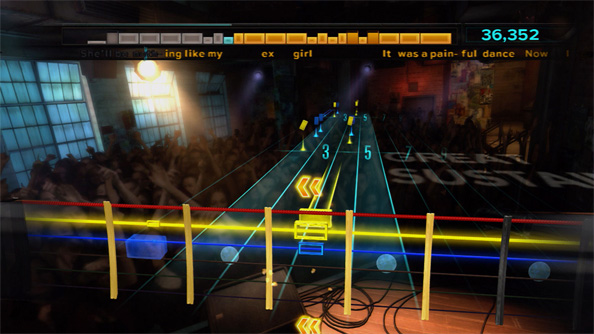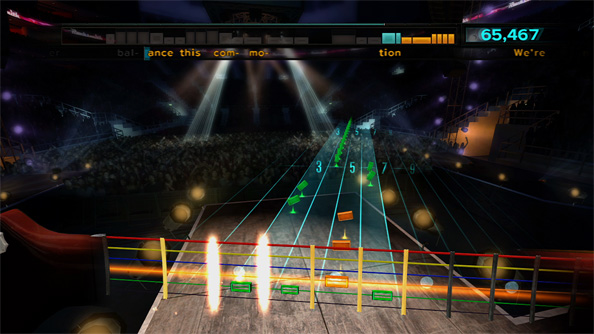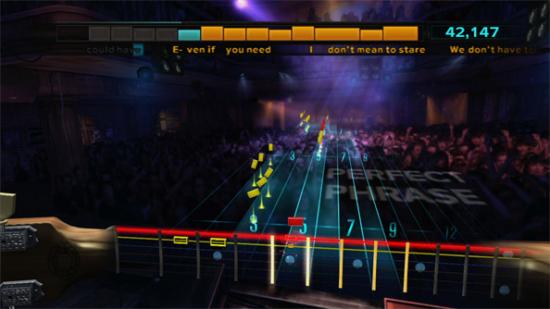Rocksmith is some sort of dark wizard magic. If you haven’t heard of it (it’s been out on the Xboxes and the Playstations in America for a while) it’s the logical endpoint of the genre spawned by Guitar Hero, except instead of having you bang away on a plastic facsimile of an instrument, Rocksmith plugs into any real electric or bass guitar, detecting the notes being played and teaching you to strum along to a library of over 50 tunes. It works. I know it works because my fingers hurt.
To look at, Rocksmith resembles other guitar-based rhythm action games. A fretboard of notes glides towards you, with the aim being to play each note as it arrives at the bottom of the screen. Rather than five buttons and a Fisher Price strum-bar, of course, you’re working with your own guitar’ssix strings and 21 frets, so a degreeof colour coding and brainco-ordination is required before you can effortlessly intuit the screen without having to stop andrecall which string orange represents. It’s fairly straightforward at first, largely in Guitar Heroes footsteps at the basic end of the difficulty scale – you’ll figure the thing out in the course of half an hour if you’ve picked up a guitar before.
Rocksmith starts you off gently otherwise: suggesting Technique Challengesdesigned to train you (specifically you, it monitors your strengths and weaknesses)in various guitar techniques, or allowing youpluck along to individual notes in a song of your choice until you’re confident enough to move on.
In fact, Rocksmith is less ofa game andmore of a guitar teaching aid. It dynamically adjusts the difficulty level as you play, so miss enough notes in a phrase and your invisible mentor will send only half as many notes down the fretboard during the next riff. Start nailing solos and the difficulty will increase until you’re playing every note and chord in the arrangement. For example, whileI awkwardlypicked my way through somescattered notes ofThe Strokes’ Under Cover Of Darkness, handing the guitar to Ubisoft’s Brian McClure inspired the game to chuck a rainbow of complex chords, notes, bends, sustains andpalm mutes down the fretboard, which he expertly noodled his way through.
There’s no fail state either. Rocksmith isn’t out to beat you: most songs are unlocked from the outset, including universally appreciatedstuff byRadiohead, Pixies, Queens of the Stone Age, Jarvis Cocker, Blur, Bowie, Museand Franz Ferdinand. Within these songs, you can drill down to individual phrases and solos to practice, either by slowing the riffs down and having them speed up as you improve, orhaving the music stop completelyuntil youmanage tofind the correct note.

The teaching aids also come in the form of some quirkyarcade-styled minigames, such as a duck huntinggame in which you fire by plucking the correct string and aim by placing your finger on the correct fret. A Bit.Trip Runnerstyle game starring an ostrich galloping through space trains you to tremolo: the faster you strum a string the faster the ostrich runs, while changing up and down strings switches lanes on-screen to avoid obstacles. It’s the closest Rocksmith comes to feeling like a game rather than a tutor.
All of this is guitaringachieved using some arcane tech-magic built into the cable connecting your guitar to your PC, which means it works with anything that plugs into a quarter inch jack and makes guitar noises.And for the presently guitarless,Rocksmith will come bundled with an Epiphone Les Paul Junior for somewhere around the £140 mark on Amazon. It’s out October 19 on Steam and, presumably, those magic cables will be available to buy somewhere too.
There’s really very little to criticise here: Rocksmith is an intuitive and adaptiveguitar training tool. Maybe it’s a bit po-faced for those who might be searching for another cartoon-rockstar simulator, or limited in terms of its pick-up-and-playparty appeal – but that’s not what the game sets out to achieve.The European version adds support for bass guitars, on top the karaoke support already present, so that co-operative play lends the game a social edge assuming you’ve got friends who can play or sing.
Otherwise, Rocksmith is simply about the relationshipbetween you, the dusty electric guitar you bought at 16 to impress a girl and then promptly forgot about, and your bleeding index finger.
